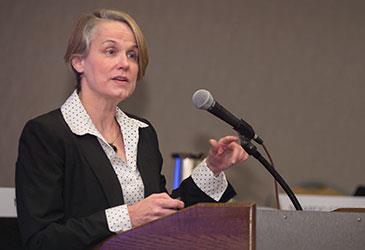Publishing papers is more challenging than in previous years—especially as journal editors grapple with high-volume submissions and competitive “impact factor” quotas in medical publishing. But knowing how to carefully think about your research, even before you write it, can help you pen an effective paper that has a greater chance of seeing print. Gear up for a productive writing process with these five tips from a medical publishing maven who understands your perspective.
Susan Bates, MD (pictured right), has been published more than 250 times and owns multiple patents. Dr. Bates is the senior clinical investigator and head of the Molecular Therapeutics Section in the Developmental Therapeutics Branch and Coronary Vector of Columbia University’s BA Cancer Initiative and has mentored multiple fellows.
While she acknowledges that “it’s getting harder and harder to publish papers these days,” Dr. Bates emphasizes that publishing is essential for the sake of advancing society and medicine.
“One must write something and get it into print,” she told residents and fellows at a special session during the 2015 AMA Interim Meeting. “We have an ethical imperative to publish. We have to share data whether it’s negative or positive, and move the field forward.”
To write a successful paper, she advises physicians in training to understand what makes a “good” paper and how to tackle large research projects. Dr. Bates recommends five steps every medical researcher should follow:
Start the paper when you start the project
While it may be tempting to preoccupy your time with lab work, Dr. Bates suggests that you actually write your paper as you conduct research—not at the end of a project. This will help you identify informational gaps and data you may need to further explore to complete your paper for publishing.
“You need to be thinking about the paper from the get-go,” Dr. Bates said. “It’s not cheap science to think about the paper. It’s a way of executing what you do …. You need to have an idea about the point of your paper and the story you’re going to tell.”
Think carefully about shared authorship
“In this day and age, so many experiments are required to make a paper work that you’ll end up much better off if you collaborate,” Dr. Bates said.
However, should you decide to collaborate with other authors, Dr. Bates recommends setting firm authorship guidelines and clearly articulating who will be lead author based on how much this person actually contributes to the project. You also should be judicious in terms of how many people you collaborate with for a given project.
“More and more journals don’t want people to have honorific authorships,” Dr. Bates said, noting that some journals even limit the number of authors on a paper.
“You’re not supposed to give your buddies authorship simply because you want to help each other. If you’re doing a clinical trial, you may find that if you didn’t enroll enough patients, you don’t even get authorship,” Dr. Bates said.
When sharing authorship, she also advises residents and fellows to take credit for their work by properly noting authorship on their CVs. If more than one author equally contributes to the project, Dr. Bates said, it’s perfectly acceptable for both authors to list themselves as the “lead author” on their CVs.
Take a close look at your data
“Your manuscript is going to get evaluated based on how strong your data are. Work on your data until it’s strong enough to draw a conclusion and then write about that conclusion,” Dr. Bates said. “That’s part of why you keep writing, outlining and making figures as you go along and thinking, ‘Is this result what I need? Is this enough?’”
If your paper discusses a clinical trial, “then of course you have to wait until the trial is over,” she said. “But for many projects, the data can be gathered as you go along.”
Know what your paper is
Ask yourself this honest question: Is my research a big conceptual advancement, or is it incremental?
“Much of science is incremental, and scientists get in trouble when they try to make huge, conceptual advancements,” Dr. Bates said. “Every paper can’t be like that. The vast majority of papers are actually incremental.”
Think like a reviewer
Carefully examine your project as if you are your own unapologetic reviewer. Be prepared to address the limitations of your study and data, especially if you’re conducting clinical trials. “We always say in our data meetings, ‘If your data can’t convince your friends, how is it going to convince your reviewer or your enemies and critics?” Dr. Bates said.
This is why she urges researchers to consider whether their paper actually adds valuable information to their respective field or specialty—not simply their CV.
“While it’s perfectly reasonable to be incremental, you do need to add to the field and think expansively and ask, ‘What questions can I answer with the data and model I have for this project?’”
Explore more on publishing
- Learn how to publish your research like a pro with these five strategies.
- Bookmark this list of the top journals that accept research from physicians in training.
- Read how to get your research published.
- Follow these 9 expert tips for getting published in a medical journal.
- Remember that publishing (like research) is a learning process, so if your paper gets rejected—don’t worry. Here’s how to handle it.




